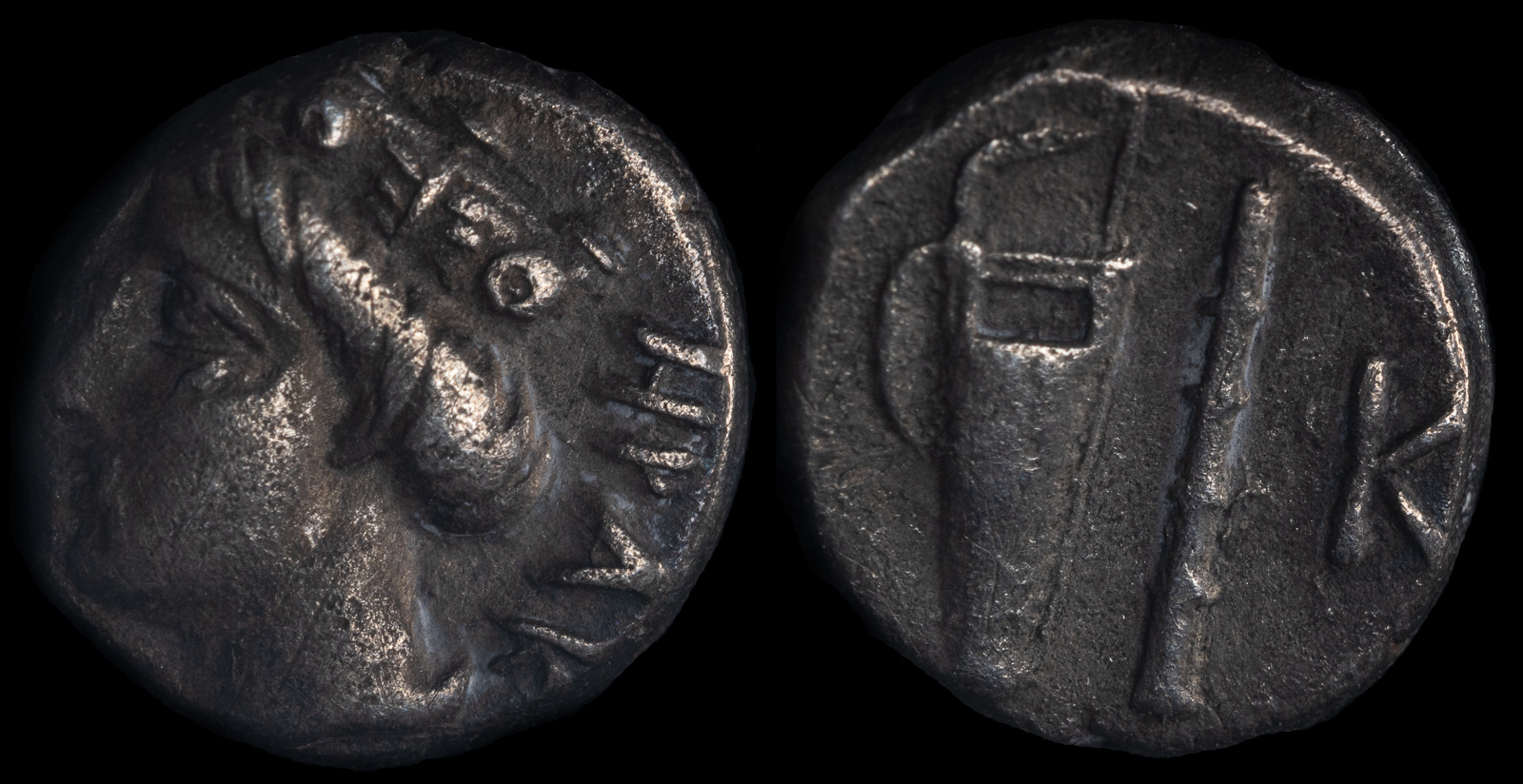
Bithynia, Herakleia Pontika
Klearchos (Tyrant, circa 364-352 BCE)
AR Obol 0.81g 9mm
Obv: ΗΡΑK. Turreted head of Hera-Tyche left.
Rev: Quiver and club; K to right.
SNG BM Black Sea 1592; HGC 7, 476
t’s no secret that ancient philosophy covered what was the best of many things. In particular, the ideal form of government was a common topic and the subject of Aristotle’s famous Politics. In it, he covered the differences between monarchy, aristocracy, and polity. Interestingly, he found no one system the best, but did remark that democracy tended to be the most stable, but each had an accompanying “bad” form and each would in time give way to another.
Yet, despite all the debates and banter about the ideal political system, it was mostly just that. This led to a debate on whether the philosopher, convinced that his convictions were for the public good, should take action. In other words, was this all just theoretical, or could these changes and knowledge be put into effect? Plato himself tried this to some degree with Dionysios, the tyrant of Syracuse, and it ended badly with his suggestions ignored and an extended Sicilian stay.
However, the matter would end far differently with Klearchos of Herakleia Pontika.
Klearchos himself was a philosopher, and at some age traveled to Athens and studied with Plato himself and Isokrates. Since he had the reputation of a learned man, he was recalled to the city to quell an issue between the populace and the oligarchs. He then arranged a deal with the satrap Mithridates to hand him the city, but in the first of many betrayals, he instead took him prisoner and forced him to pay a hefty ransom.
Over the following years, Klearchos consolidated his power by butchering both the populace and the aristocracy. His habit for cruelty was heard in Athens, where Isokrates in particular had great displeasure. Of course, we’re not entirely sure what bugged them more: Klearchos’ cruelty or his friendship with the Persians. Regardless, he was now on their shit list.
Klearchos’ tyranny resulted in many exiles, typical of the time, and one such was a man named Chion. He also studied under Isokrates, and soon came to believe that philosophy was not merely for preaching but also for action. Spurred on by his teacher, he returned to Herakleia Pontika, tricked Klearchos into believing him a friend, and killed him. According to ancient sources, Chion and his co-conspirators were then butchered by Klearchos’ bodyguards.
The story of Chion’s thoughts and actions can be read today in Letters of Chion, perhaps the first epistolary novel in existence. It consists of a series of seventeen letters, most of them from Chion to his father, in which he debates action vs idleness, creates his plan, and carries it out (though the last letter is a suicide note to his teacher and we’re left to history to learn the result). While ancient sources believed these to be authentic 4th century BCE letters, they’re now strongly believed to originate from the 1st or 2nd centuries CE.
If these “letters” were crafted much later, what was their purpose? Some guess that they may have been directed at Domitian, but we have no way to truly know.
Ironically, Chion’s efforts, though successful in their immediate goal, failed to remove the tyranny. After Klearchos’ death, his brother Satyros took over as regent for his sons Timotheos and Dionysios. Timotheos then took power and soon shared it with Dionysios, who later ruled alone after his brother’s death.
Dionysios played a part in the struggles between the Diadochi, and proved just as adept as his father in choosing alliances wisely in order to stay in power. He eventually married Amastris, who had previously been married to the Macedonian general Krateros.
She in turn married Lysimachos after Dionysios‘ death, and eventually became the first woman to issue coins in her own name. Shortly thereafter, she was drowned by her two sons (if you want happy endings, stay away from this period).
The anonymous Letters of Chion and Aristotle’s Politics are just as relevant today. Is it possible to discuss politics on a mere theoretical level, or should the learnings of such academics be put into action, sometimes forcefully? Is any system of government truly the ideal, or are all destined to give away to another?
Klearchos learned this the hard way.
Klearchos is born.
Klearchos obtains a band of mercenaries and takes control of Herakleia Pontika.
Klearchos is murdered at Herakleia Pontika by Chion and Leon. His brother Satyros takes over.
Satyros murders the families, including the children, of all who took part in the assassination of his brother, Klearchos, in Herakleia Pontika. However, he protects his brothers’ children, including Dionysios.
Death of Satyros of Herakleia Pontika. Timotheos, the son of Klearchos, takes over and makes his brother Dionysios a joint ruler.